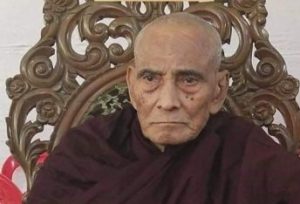My favourite character in Alan Bennett’s The History Boys is easily Donald Scripps. Chaste and devoted, Scripps is a lay Anglican amidst a cohort of irreverent classmates, and a prolific, vulgar swearer. It couldn’t hurt to have more Buddhists like him: nonchalant and darkly humorous, with a sincerity and compassion that catch lonely people off-guard. An avid churchgoer who can be found at the pews, Scripps tolerates the crazy world around him because his faith is his being. Scripps is nothing without his religion (and what he can truly say about himself is nothing else except his faith). When it is his turn to get on the bike of “general studies” teacher Hector to ride home (which is well-known as Hector’s chance to try groping the victim), Scripps boasts wryly, “The things I do for Jesus.” His bisexual buddy, Dakin, has a sardonic question for Scripps’ simultaneous profanity and piety: “Does the Archbishop of Canterbury know you talk like this?”
I like Scripps’ observer’s attitude about everything, especially his benevolent indifference to the homosexual hunger exploding from some of his classmates and teachers. His attitude is just so Anglican: be moral, but don’t be moralistic. But reverent Scripps rightly does not turn to God because of absurdity, but in spite of absurdity. We glimpse his empathy and sensibility underneath his generous grins and quick-witted responses to the other characters. He finds himself in the role of an unofficial pastoral carer for Posner, who is lovesick for Dakin (who in turn lusts after their history teacher, Irwin). On one occasion, Scripps offers some cryptic advice bound to give an orthodox theologian a headache. “Love can be very irritating,” he assures Posner, observing him watching Dakin yearningly.
“How do you know?” comes Posner’s miserable challenge.
“That’s what I always think about God. Must get so pissed off, everybody adoring him all the time.”
“Yes, only you don’t catch God poncing about in his underpants.”
As a character Scripps is the opposite of a pretentious and self-righteous pontificator: he is sharp and perceptive. Scripps seems very mindful of the mystery that is part-and-parcel of religious life. If there was ever a fictional character that came close to embodying the Buddhist ideal of nonattachment to doctrines and creeds, it was an Anglican (but perhaps that’s not surprising). Well aware that his faith demands a commitment and sacrifice, he is honest with himself, unable to hide his envy of Dakin’s freedom. When a demands a “full report” from Dakin about the latter’s date with Irwin, Dakin rounds on him:
“Are you jealous?” asks Dakin in gleeful realization.
“N – “
“You’re jealous, aren’t you?!” presses Dakin triumphantly. At last, the man of faith reveals weakness!
“No, not of the sex,” clarifies Scripps in exasperation. But he concedes reluctantly, “Just… of… your being up for it.” He shrugs mildly. “Me, I…”
By the play’s end, Scripps is revealed to have become a journalist constantly threatening to leave his career in order to “really write.” While it’s unlikely to be because of the recent hacking scandals and the Leveson enquiry, Scripps might be implicitly admitting that the excesses of journalism can make it much less respectable than, say, the career of a novelist. Yet why can’t one be both? Scripps is, after all, one of the more articulate and eloquent of the characters. This is simply my guess, but his critique of his own profession might be an awareness of the fact that writing has given its acolytes the undeserved privilege of sharing an opinion – even if it’s supposed to be something important – and counting it as “work.” The greatest, most obvious privilege is the one taken for granted to pay the rent.
If nothing else, Scripps helped me to realize that propriety doesn’t contradict irreverence. In more liberal schools of Buddhism, especially Western Zen and some forms of Tibetan Buddhism, we have “crazy wisdom” and the use of humour to teach. Still, proper manners should be shown in front of the Archbishop of Canterbury, or in my case, my preceptor who transmitted to me my Buddhist vows. Both Anglicanism and Chinese Buddhism are ritualistic and strict about the observance of ethics and vows. Obeying such rules might seem stuffy. But life is too absurd, too random, too surreal, and too short to not be moral. I still reckon Scripps had the right idea when Dakin asked how he would say thank you, giving an answer that was at once God-fearing, sympathetic to Dakin’s lust for Irwin, and merciless:
“On my knees, probably. Same as you.”













